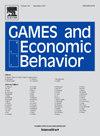Two-person bargaining when the disagreement point is private information
IF 1
3区 经济学
Q3 ECONOMICS
引用次数: 0
Abstract
We consider two-person bargaining problems in which (only) the disagreement payoffs are private information and it is common knowledge that disagreement is inefficient. We show that, in the NTU-case, if the Pareto frontier is linear, the players' interim utilities of an ex post efficient mechanism cannot depend on the disagreement payoffs. If the frontier is non-linear, the result continues to hold when the conflict payoffs are independent, or one player has at most two types. In the TU-case, a similar independence result holds for ex post efficient mechanisms that are individually rational, provided the players' budgets satisfy a certain condition. We discuss implications of these results for axiomatic bargaining theory, surplus extraction by an informed principal and egalitarian mechanisms.
当分歧点是私人信息时,两人讨价还价
我们考虑两个人议价问题,其中(只有)分歧的回报是私人信息,而分歧是低效的这是众所周知的。我们证明,在ntu情况下,如果帕累托边界是线性的,参与者的事后有效机制的临时效用不能依赖于分歧收益。如果边界是非线性的,当冲突收益是独立的,或者一个玩家最多有两种类型时,结果仍然成立。在tu案例中,类似的独立性结果适用于个体理性的事后有效机制,前提是参与者的预算满足一定条件。我们讨论了这些结果对公理化议价理论、知情委托人的剩余提取和平等主义机制的影响。
本文章由计算机程序翻译,如有差异,请以英文原文为准。
求助全文
约1分钟内获得全文
求助全文
来源期刊

Games and Economic Behavior
ECONOMICS-
CiteScore
1.90
自引率
9.10%
发文量
148
期刊介绍:
Games and Economic Behavior facilitates cross-fertilization between theories and applications of game theoretic reasoning. It consistently attracts the best quality and most creative papers in interdisciplinary studies within the social, biological, and mathematical sciences. Most readers recognize it as the leading journal in game theory. Research Areas Include: • Game theory • Economics • Political science • Biology • Computer science • Mathematics • Psychology
 求助内容:
求助内容: 应助结果提醒方式:
应助结果提醒方式:


